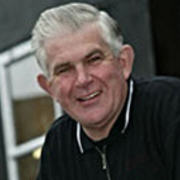
Laurie Dee
Laurie Herdman grew up in Christchurch, where during a high school boxing class he once successfully landed a punch on future All Black Alex Wyllie. After leaving school, Herdman tried some farming-related jobs, but quickly grew bored.
Playing ‘Twist and Shout’ to a screaming audience of teens was another thing entirely. Herdman began playing in bands, and after two attempts, got a job as a live DJ. He began throwing in comedy pieces and silly stunts inbetween the platters. One day he opened the newspaper and discovered that promoter Trevor Spitz had changed his on-stage name to Laurie D, after Spitz was forced to fill a gap in a newspaper ad.
The ‘D’ became Dee, and in the early 70s, Dee became lead singer for Christchurch band Beam Unity. Renamed Beam (later Laurie Dee and Beam) the covers band relocated to Auckland where they got an ongoing gig touring Lion Breweries pubs around the North Island, and also took part in a C’mon tour with Peter Sinclair.
By now band and singer were no longer seeing eye to eye. After Dee sang a recent Dylan performance in Dylan-style for 1974 music show Free Ride, the band were summoned individually to the offices of producer Kevan Moore. Told he had a bit of a thing for comedy, Dee — who hadn’t been trying for comedy at all — was unsure if he was being complimented or insulted. Then he was invited to join the cast of Moore’s latest musical covers show Sing. The band wasn't.
Over the next few years Dee released a solo single (‘My Love and I’), hosted game shows (Stumpers, Child's Play) and appeared on musical series and dramas. When Tom Parkinson launched nostalgic variety show Radio Times, Dee joined the ensemble, performing musical numbers under two different personas. During the show’s successful three-year run, Dee had a Number Six hit with a rugby version of perennial tune ‘The Deck of Cards’. And when Radio Times host Billy T James was given his own spin-off show, Dee was tapped to be his main offsider.
Parkinson called Dee ”the absolute, perfect straight man” and “one of the best foils ever” — always supporting other performer’s lines, rather than trying “to grab or upstage the joke or Billy”. Billy T James Show veteran Jeff Bennett rates Dee as both an actor and writer, calling him ”a superb talent”.
Dee can be spotted in The Best of the Billy T James Collection playing opposite Billy variously as an old lady, a shop worker, and as the silver-helmeted policeman in the 'YMCA' take-off.
Dee and James began working on routines together at Billy’s house, and were soon added to the writing team. Billy’s trademark “come here, come here” line, often used to invite the audience into a story or joke, was born during rehearsals, when the two would start to whisper jokes to each other after the dancers told them to keep quiet.
Dee, James, Phil Gifford and veteran performer Doug Aston had begun writing for The Billy T James Show’s fifth season when the rules abruptly changed. After the departure of producers Jeff Bennett and Tom Parkinson, Dee discovered that his services were no longer required. Gifford and Dee successfully took TVNZ to court over claims they were owed money, despite lacking a written contract to back them up.
Comedy and song are not Dee’s only talents. His dramatic roles include playing dad to the psychic twins in sci-fi classic Under the Mountain, appearing in the ‘Defence of Minnie Dean’ episode of Hanlon, cameoing as a workman in Terry and the Gunrunners, and as a policeman in breakthrough feature Sleeping Dogs. Performances for TVNZ were few and far between after the lawsuit; in the 90s Dee appeared in Gen X series City Life, and short film The Wall.
Dee has also worked behind the scenes on a range of promotional campaigns. A one-time assistant national organiser on Telethon, he spent time travelling the country as a Telethon Ambassador, explaining to school-children where the money was being utilised. Later Dee worked on the America's Cup, the completion of Auckland cathedral and masterminded the Queen's Baton Relay for the 1990 Commonwealth Games.
Prior to becoming an entertainer, Dee had gained a trade certificate in engineering; he is also a prodigious inventor. After multiple knockbacks, he successfully developed The Hedgehog, a multi-award-winning filter for roof-gutters that is sold in Australia, the United States and NZ.
Sources include
Matt Elliott, Billy T - The Life and Times of Billy T James (Auckland, HarperCollinsPublishers, 2009)
The Hedgehog website. Accessed 15 September 2016